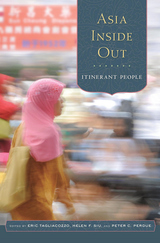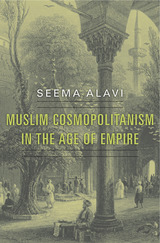
A pioneering study of historical developments that have shaped Asia concludes with this volume tracing the impact of ideas and cultures of people on the move across the continent, whether willingly or not.
In the final volume of Asia Inside Out, a stellar interdisciplinary team of scholars considers the migration of people—and the ideas, practices, and things they brought with them—to show the ways in which itinerant groups have transformed their culture and surroundings. Going beyond time and place, which animated the first two books, this third one looks at human beings on the move.
Human movement from place to place across time reinforces older connections while forging new ones. Erik Harms turns to Vietnam to show that the notion of a homeland as a marked geographic space can remain important even if that space is not fixed in people’s lived experience. Angela Leung traces how much of East Asia was brought into a single medical sphere by traveling practitioners. Seema Alavi shows that the British preoccupation with the 1857 Indian Revolt allowed traders to turn the Omani capital into a thriving arms emporium. James Pickett exposes the darker side of mobility in a netherworld of refugees, political prisoners, and hostages circulating from the southern Russian Empire to the Indian subcontinent. Other authors trace the impact of movement on religious art, ethnic foods, and sports spectacles.
By stepping outside familiar categories and standard narratives, this remarkable series challenges us to rethink our conception of Asia in complex and nuanced ways.

Muslim Cosmopolitanism in the Age of Empire recovers the stories of five Indian Muslim scholars who, in the aftermath of the uprising of 1857, were hunted by British authorities, fled their homes in India for such destinations as Cairo, Mecca, and Istanbul, and became active participants in a flourishing pan-Islamic intellectual network at the cusp of the British and Ottoman empires. Seema Alavi traces this network, born in the age of empire, which became the basis of a global Muslim sensibility—a form of political and cultural affiliation that competes with ideas of nationhood today as it did in the previous century.
By demonstrating that these Muslim networks depended on European empires and that their sensibility was shaped by the West in many subtle ways, Alavi challenges the idea that all pan-Islamic configurations are anti-Western or pro-Caliphate. Indeed, Western imperial hegemony empowered the very inter-Asian Muslim connections that went on to outlive European empires. Diverging from the medieval idea of the umma, this new cosmopolitan community stressed consensus in matters of belief, ritual, and devotion and found inspiration in the liberal reforms then gaining traction in the Ottoman world. Alavi breaks new ground in the writing of nineteenth-century history by engaging equally with the South Asian and Ottoman worlds, and by telling a non-Eurocentric story of global modernity without overlooking the importance of the British Empire.
READERS
Browse our collection.
PUBLISHERS
See BiblioVault's publisher services.
STUDENT SERVICES
Files for college accessibility offices.
UChicago Accessibility Resources
home | accessibility | search | about | contact us
BiblioVault ® 2001 - 2024
The University of Chicago Press









